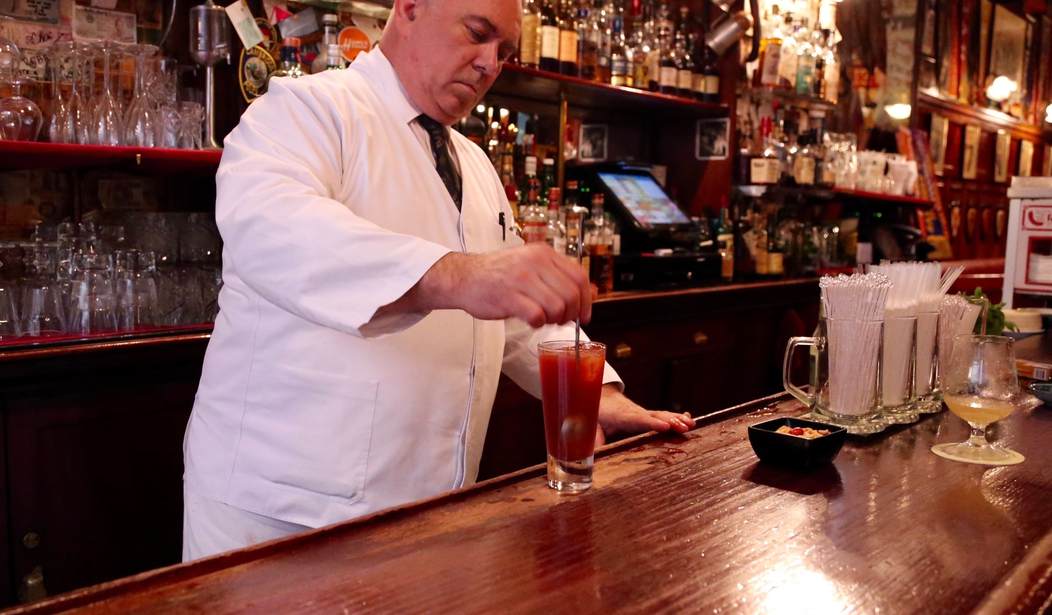Not a lot, to be honest, but that isn’t stopping one gun control advocate from arguing that the training she received as a waitress is somehow comparable to requiring training and licensing mandates for all those hoping to exercise their right to keep and bear arms.
Writing at the Nashville Tennessean, Hannah Westphall details the process that had to go through before she was allowed to serve drinks; a four-hour training session that covered everything from how to tell if a patron has had to much to drink to the legal liability that servers could face if an inebriated customer is caught behind the wheel or commits another crime while under the influence.
I tell this story to underline a simple truth: The state of Tennessee, like most other states, recognizes that alcohol consumption under the wrong circumstances can be a dangerous weapon. The weight of the consequences of its misuse can be incredibly severe, not just for the person drinking, but also for the person slinging the drinks behind the bar. In fact, the dangers are taken so seriously that to simply be allowed to deliver an alcoholic beverage from the bar to a patron’s table, you must first acquire government-approved training and permitting to ensure you fully appreciate the responsibility you incur by doing so.
Anyway, when Democrats talk about wanting to enact basic gun-control measures that ensure gun owners are trained, licensed and as aware as possible of the immense responsibility they are taking on, this is what we have in mind. It’s not without precedent. It’s more than reasonable. And it unimpeachably falls within the “well-regulated” element of the Second Amendment.
Uh, no it does not. The “well-regulated” element of the Second Amendment refers to a militia, not to the people who possess the right to keep and bear arms. A “well-regulated” (trained) militia was seen as a bulwark of liberty, but the right to keep and bear arms is not subject to solely to service in the militia, as the Supreme Court has now extensively written about. Gun licensing, further, has nothing at all to do with being “well regulated,” which again, at the time of the Founding, referred to the training one participated in as a member of the militia and not the amount of regulations that gun owners (including those not in the militia) were subjected to.
Beyond that, Westphall’s analogy just doesn’t make much sense to me. If she was comparing her experience waiting tables to someone working in a gun store, she might be more on the mark, but perhaps she’s unaware that, just like servers, gun store employees can also be held responsible if they knowingly sell a gun to someone who’s not allowed to purchase one.Just like restaurants, businesses engaged in the selling of firearms have to comply with a host of regulations imposed by the federal, state, and in some cases local governments. In fact, the owner of any such company must possess a Federal Firearms License that allows them to conduct their business.
You don’t, however, have to take a four-hour training course before you can legally have a cocktail or a beer in Tennessee. You don’t have to be licensed by the state before you can offer your buddy a drink when they come over to your home. The personal consumption of alcohol and the business of selling alcohol to customers are two very different things in the eyes of the state.
I agree with Westphall that gun owners should be aware of the legal responsibilities that come with exercising your right to keep and bear arms, as well as having enough training so that they’re competent and confident in using their firearm. I don’t, however, agree that law-abiding individuals should be prevented from exercising their Second Amendment rights until they’ve satisfied any sort of training or licensing mandate on the part of the state. We should absolutely be encouraging firearms training and education, but we shouldn’t criminalize the possession of a gun by someone who hasn’t sat through 8 (or 16, or 24) hours of classwork.
I suspect that Westphall, like many gun control advocates, is far more interested in those government requirements than actually increasing training opportunities. After all, there’s nothing stopping her or other gun control activists from adopting programs like the one run by Louisville pro-gun activists Armed and Educated, which provides groceries or gift cards in exchange for sitting through a short lesson on basic firearms safety. Can you imagine how many people could benefit if the gun control lobby got behind efforts like that instead of trying to curtail the constitutionally-protected rights of responsible Americans?
We can promote education and training without requiring government intervention, but it sure would help if the gun control lobby and anti-gun politicians wouldn’t do things like blocking gun ranges from opening for business or imposing so many barriers to gun ownership that some individuals will find it difficult or impossible to meet the training requirements without great personal sacrifice and and at a substantial financial cost. Of course, if they did that they’d be violating one of the core tenets of the cult of the gun ban: thou shalt not to anything that could lead to more gun ownership. Demanding training is perfectly fine; helping to make it easily accessible (and voluntary), on the other hand, is a non-starter. It’s enough to make a real gun safety advocate want an unlicensed and non-governmental-sanctioned drink… or maybe two.









Join the conversation as a VIP Member